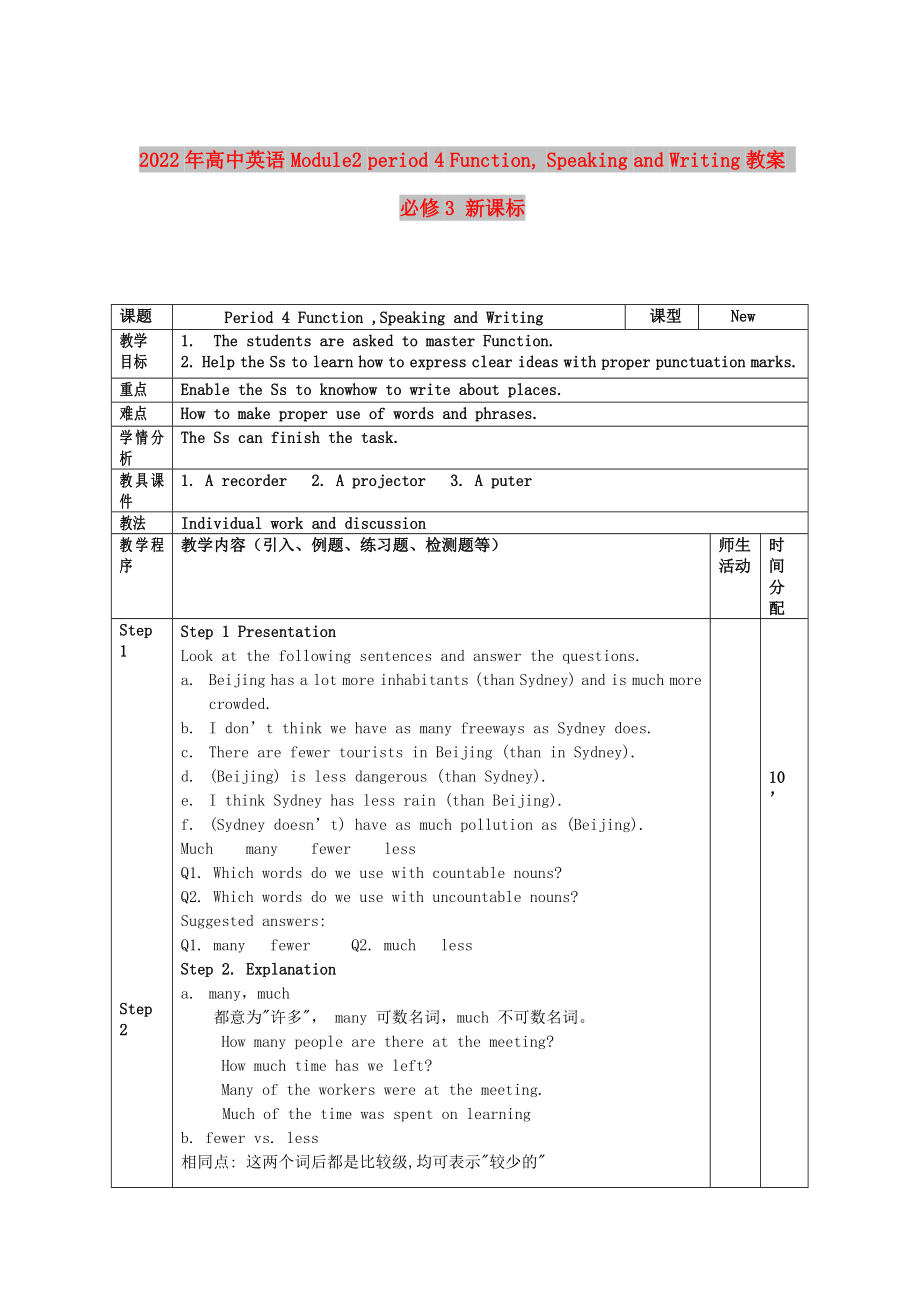《2022年高中英語(yǔ) Module2 period 4 Function, Speaking and Writing教案 必修3 新課標(biāo)》由會(huì)員分享��,可在線閱讀��,更多相關(guān)《2022年高中英語(yǔ) Module2 period 4 Function, Speaking and Writing教案 必修3 新課標(biāo)(3頁(yè)珍藏版)》請(qǐng)?jiān)谘b配圖網(wǎng)上搜索�����。
1�����、
2022年高中英語(yǔ) Module2 period 4 Function, Speaking and Writing教案 必修3 新課標(biāo)
課題
Period 4 Function ,Speaking and Writing
課型
New
教學(xué)
目標(biāo)
1.?The students are asked to master Function.
2. Help the Ss to learn how to express clear ideas with proper punctuation marks.
重點(diǎn)
Enable the Ss to knowhow t
2��、o write about places.
難點(diǎn)
How to make proper use of words and phrases.
學(xué)情分析
The Ss can finish the task.
教具課件
1. A recorder 2. A projector 3. A puter
教法
Individual work and discussion
教學(xué)程序
教學(xué)內(nèi)容(引入����、例題、練習(xí)題��、檢測(cè)題等)
師生
活動(dòng)
時(shí)間分配
Step 1
Step 2
3��、
Step3
Step 4
Step 1 Presentation
Look at the following sentences and answer the questions.
a. Beijing has a lot more inhabitants (than Sydney) and is much more crowded.
b. I don’t
4�、think we have as many freeways as Sydney does.
c. There are fewer tourists in Beijing (than in Sydney).
d. (Beijing) is less dangerous (than Sydney).
e. I think Sydney has less rain (than Beijing).
f. (Sydney doesn’t) have as much pollution as (Beijing).
Much many fewer less
Q1. Which
5、 words do we use with countable nouns?
Q2. Which words do we use with uncountable nouns?
Suggested answers:
Q1. many fewer Q2. much less
Step 2. Explanation
a. many�����,much
都意為"許多"���, many 可數(shù)名詞��,much 不可數(shù)名詞���。
How many people are there at the meeting?
How much time has we left?
Many
6���、 of the workers were at the meeting.
Much of the time was spent on learning
b. fewer vs. less
相同點(diǎn): 這兩個(gè)詞后都是比較級(jí),均可表示"較少的"
不同點(diǎn):
⒈fewer是few的比較級(jí),只能修飾可數(shù)名詞的復(fù)數(shù).
⒉less是little的比較級(jí),只能修飾不可數(shù)名詞的復(fù)數(shù).
Step3 Practice
a. Learning about few, the fewest, fewer, the least, less, a few
Which expression will plet
7、e the sentence?
1. The exhibition was not very crowded. There were ___ people than I expected.
2. Meeting Bill Clinton was much ___ frightening than I had imagined.
3. I’ve not met him but I've heard ___ stories about him and he sounds interesting.
4. He’s __crazy than you first think. Some of
8��、 his ideas make sense.
5. That must be __frightening horror film I’ve ever seen.
6. He’s not liked. In fact he’s __ liked person in the office.
7. I’d like to go to Japan but I get so ___ opportunities to travel in my present job.
8. I’d like you to spend ___ time on your own work and more on
9�、 controlling your staff.
9. David Letterman is very famous in America but __ people in England have heard of him.
10. 15. The winner will be the person who makes __ mistakes.
Suggested answers:
1. fewer 2. less 3. a few 4. less 5. the least 6. the least 7 few
8. less 9. few 10.
10、 the fewest
b. Learning about much and many
What word do you need to plete the sentence?
1. How ___ people are you expecting?
2. How ___money do you want for this?
3. I don’t see ___ point in continuing. We’re all very tired.
4. Thank you so __ for your help.
5. We don’t stock these. We d
11�、on’t get ___ demand for them.
6. I feel __ better today, thank you.
7. I like that dress very ___.
8. There are so __ things I want to ask you.
9. There are too __ paintings to see in one visit.
10. I’m talking too ___. I’ll be quiet.
Suggested answers:
1. many 2. much 3. much 4. m
12、uch 5. much
6. much 7. much 8. many 9. many 10 much.
Step 4. Vocabulary and Speaking
a. Check the meaning of these words. Which ones describe positive features of a city?
Attractive busy dangerous dirty industrial lively modern
Noisy peaceful polluted poor smart vas
13��、t wealthy
b. Work in pairs. Which words can you use to describe these places?
New York Hong Kong Beijing Your town
c. pare two towns or cities you know. Talk about these aspects of the towns or cities.
Population industry climate location transport tourism
Step 5 Guided Writing
Yo
14���、u are going to write a description paring two places you know well. Follow these steps.
1. Think of two regions, cities, towns or villages you know well. One of them could be your hometown.
2. Write notes about some of these features:
Population climate industry location tourism transport
15���、Homework:
1. Finish your position after class.
2. Finish the exercises 20,21,22 on page 88.
10’
34’
16、
1’
板
書
Period 4 Function ,Speaking and Writing
b. many�,much
都意為"許多", many 可數(shù)名詞�����,much 不可數(shù)名詞。
How many people are there at the meeting?
How much time has we left?
Many of the workers were at the meeting.
Much of the time was spent on learning
b. fewer vs. less
相同點(diǎn): 這兩個(gè)詞后都是比較級(jí),均可表示"較少的"
不同點(diǎn):
⒈fewer是few的比較級(jí),只能修飾可數(shù)名詞的復(fù)數(shù).
⒉less是little的比較級(jí),只能修飾不可數(shù)名詞的復(fù)數(shù).
教學(xué)后記
The Ss have some difficulties in understanding the subjunctive mood.
 2022年高中英語(yǔ) Module2 period 4 Function, Speaking and Writing教案 必修3 新課標(biāo)
2022年高中英語(yǔ) Module2 period 4 Function, Speaking and Writing教案 必修3 新課標(biāo)

